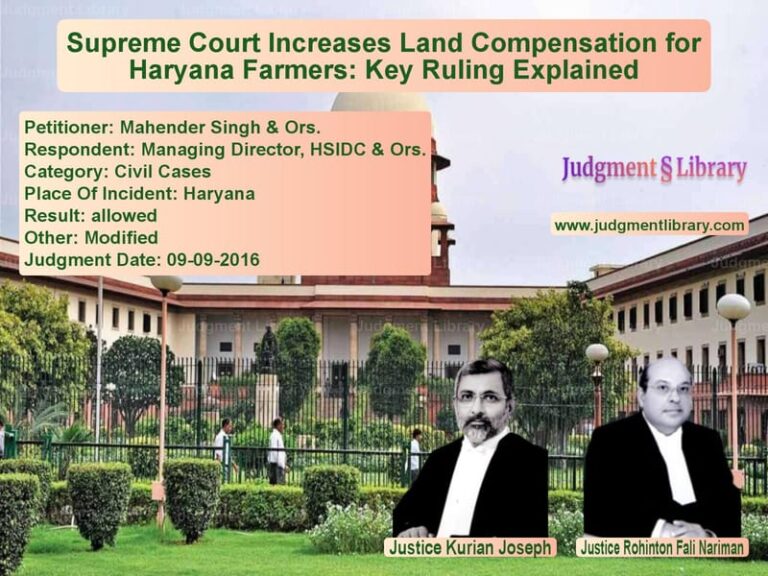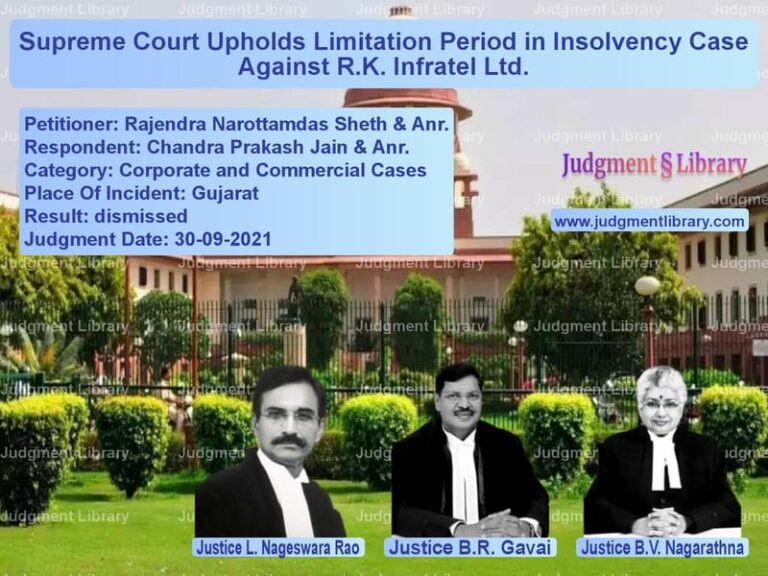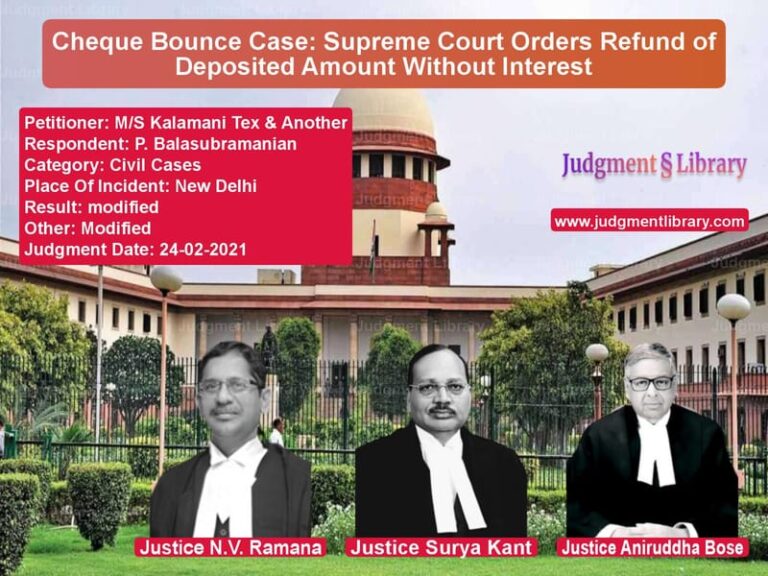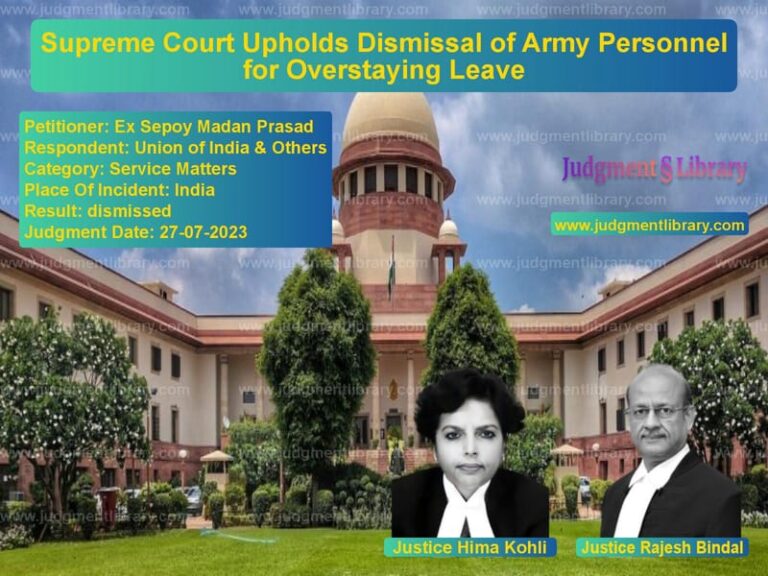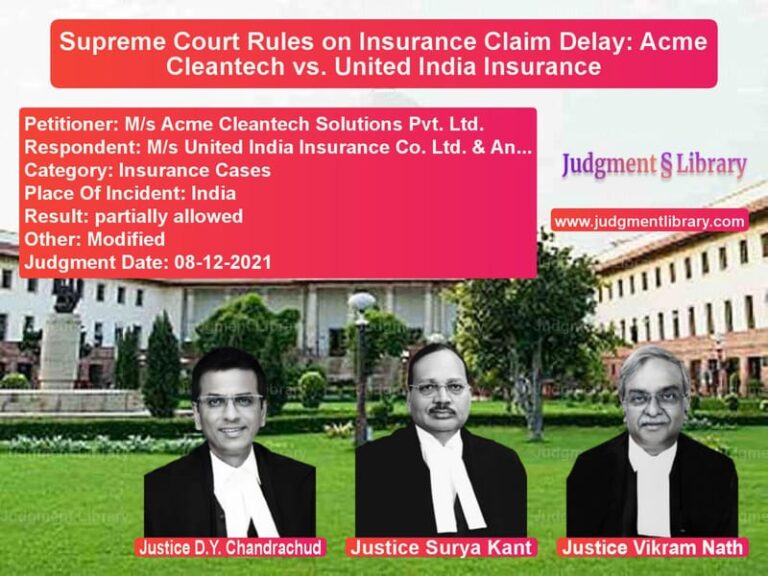Supreme Court Upholds Agreement to Sell in Property Dispute
The Supreme Court of India, in M/s. Shivali Enterprises v. Smt. Godawari (Deceased) Thru. LRs & Ors., addressed the issue of property rights and the execution of a sale deed under a specific performance action. The case, originating from a land dispute in Ghaziabad, sought to determine the validity of an agreement to sell made in 1983 between the appellant and the respondents and whether the respondents’ actions violated the terms of the agreement by denying the appellant’s rights to the suit property.
Background of the Case
The appellant, M/s. Shivali Enterprises, entered into an agreement with the respondents for the sale of land located in Chak Salarpur, Tehsil Dadri, District Ghaziabad. The agreement to sell was executed on October 29, 1983, at a price of ₹2,900 per bigha, with an earnest amount of ₹50,000 paid by the appellant. The agreement stipulated that the remaining balance would be paid at the time of the registration of the sale deed. An additional agreement was executed in August 1985 for the remaining amount of ₹1,00,000. However, due to changes in the geographical jurisdiction of the land, the sale deed was delayed.
Despite the land being in possession of the appellant, the respondents did not proceed with the sale deed execution. The appellant filed a suit for specific performance of the agreement in October 1989, following the respondents’ refusal to execute the sale deed.
Legal Issues
- Whether the appellant had a valid right to seek specific performance of the contract given the dispute over the execution of the sale deed?
- Did the respondent’s refusal to execute the sale deed amount to a breach of contract?
- Was the filing of the suit for specific performance premature considering the requirements stipulated in the agreement to sell?
Arguments by the Appellant (M/s. Shivali Enterprises)
The appellant argued that:
- The respondents had breached the contract by failing to execute the sale deed despite the appellant fulfilling its obligations under the agreement.
- The appellant had made continuous efforts to obtain possession and execute the sale deed, including paying the full sale price, but the respondents had delayed the process under the pretext of obtaining the Income-Tax Clearance (ITC) certificate.
- Due to the rising land prices, the respondents were attempting to deny the appellant’s rights and were threatening to alienate the land.
Arguments by the Respondent (Smt. Godawari’s Legal Heirs)
The respondents contended that:
- The sale deed could not be executed until the ITC certificate was obtained and the revenue records were corrected, as per the agreement’s terms.
- The suit for specific performance filed in October 1989 was premature, as the respondents had not completed the required formalities.
- The respondents had valid reasons to delay the sale deed, and no breach of the agreement had occurred.
Supreme Court’s Observations
The bench, comprising Justice B.R. Gavai and Justice C.T. Ravikumar, made the following observations:
1. The Terms of the Agreement
The Court emphasized that the appellant had fully complied with the terms of the agreement by paying the required earnest money and the balance amount. The Court found that the delay was caused by the respondents’ failure to obtain the necessary ITC certificate and make the revenue record corrections. The Court ruled:
Read also: https://judgmentlibrary.com/supreme-court-reduces-compensation-in-medical-negligence-case/
“The respondents cannot deny their contractual obligations based on procedural delays. The appellant was always ready and willing to perform his part of the contract, including paying the remaining sale price.”
2. Breach of Contract by Respondents
The Court determined that the respondents’ refusal to execute the sale deed constituted a breach of contract. It observed:
“The respondents had no legal right to delay the execution of the sale deed after the appellant had fulfilled all the requirements, including the payment of the full sale price.”
3. Premature Filing of the Suit
The Court disagreed with the respondents’ argument that the suit was premature, holding that the appellant had reasonable cause to file the suit due to the respondents’ refusal to execute the sale deed and their attempts to alienate the land to third parties:
Read also: https://judgmentlibrary.com/supreme-court-enhances-compensation-for-land-acquisition-in-haryana/
“The appellant was justified in filing the suit for specific performance as the respondents were attempting to alienate the suit property and had failed to execute the sale deed despite repeated requests.”
Final Judgment
The Supreme Court ruled in favor of the appellant and overturned the High Court’s judgment. It upheld the findings of the Trial Court and the Appellate Court, confirming that the appellant was entitled to specific performance of the agreement. The Court directed:
- The respondents are to execute the sale deed in favor of the appellant, as per the agreement to sell.
- The appellant is required to pay the prevailing market value of the land at the time of execution, which reflects the escalation in the land prices.
- The respondents’ refusal to execute the sale deed is deemed a breach of contract, and the appellant’s suit for specific performance is maintained.
Key Takeaways from the Judgment
1. Enforcement of Agreements to Sell
The ruling reaffirms the principle that an agreement to sell is a legally binding document, and the failure of one party to honor it without valid reasons can result in a suit for specific performance.
2. Validity of Specific Performance Suits
The judgment clarifies that a suit for specific performance is valid even if certain conditions, like obtaining clearance certificates, are delayed, provided the plaintiff has fulfilled his obligations and the defendant has refused to perform the contract.
3. Importance of Documented Evidence
Courts rely heavily on documentary evidence when adjudicating disputes involving agreements to sell. In this case, the consistent evidence provided by the appellant regarding the payment and possession of the property was crucial to the success of the suit.
Conclusion
The Supreme Court’s judgment in M/s. Shivali Enterprises v. Smt. Godawari (Deceased) Thru. LRs & Ors. serves as an important precedent for property law in India, particularly regarding the enforcement of agreements to sell and the rights of parties to seek specific performance. By upholding the appellant’s right to enforce the sale agreement despite procedural delays by the respondents, the Court has reinforced the sanctity of contracts and the obligations of both parties in property transactions.
Petitioner Name: M/s. Shivali Enterprises.Respondent Name: Smt. Godawari (Deceased) Thru. LRs & Ors..Judgment By: Justice B.R. Gavai, Justice C.T. Ravikumar.Place Of Incident: Ghaziabad, Uttar Pradesh.Judgment Date: 13-09-2022.
Don’t miss out on the full details! Download the complete judgment in PDF format below and gain valuable insights instantly!
Download Judgment: ms.-shivali-enterpr-vs-smt.-godawari-(decea-supreme-court-of-india-judgment-dated-13-09-2022.pdf
Directly Download Judgment: Directly download this Judgment
See all petitions in Contract Disputes
See all petitions in Property Disputes
See all petitions in Specific Performance
See all petitions in Judgment by B R Gavai
See all petitions in Judgment by C.T. Ravikumar
See all petitions in allowed
See all petitions in Quashed
See all petitions in supreme court of India judgments September 2022
See all petitions in 2022 judgments
See all posts in Civil Cases Category
See all allowed petitions in Civil Cases Category
See all Dismissed petitions in Civil Cases Category
See all partially allowed petitions in Civil Cases Category


